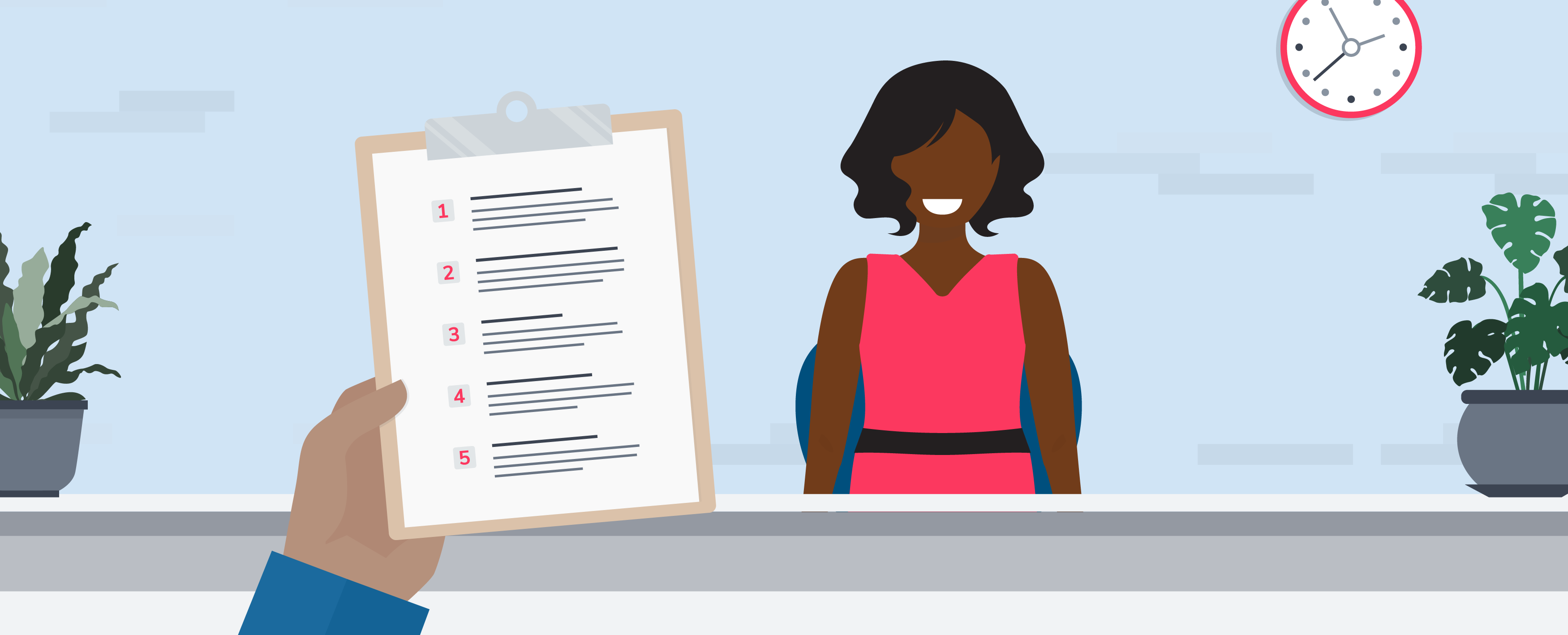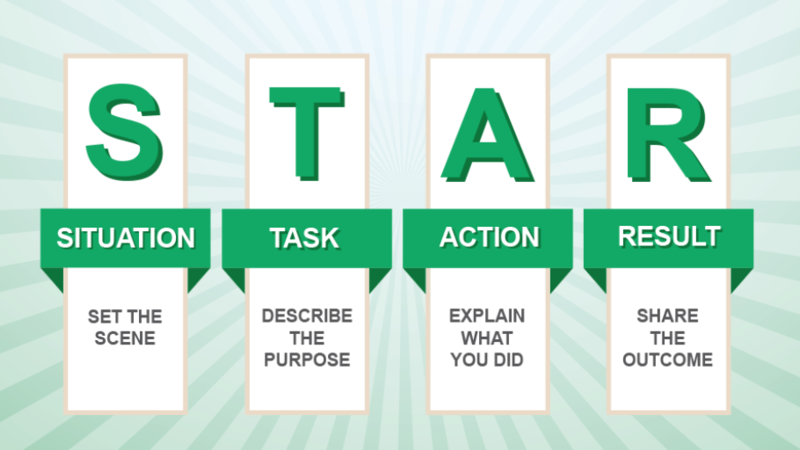Your Job Interview: Tips and Advice

Interviewing is a skill, in which your ability to build a rapport with interview panel members and communicate your skills and expertise clearly are just as important as your relevant experience for the role which you presented on your CV. Just like any other skill, interviewing well can be developed with practice.
By preparing for your interview in advance you will feel more at ease in advance of going into the interview room, and you will give yourself the very best opportunity to succeed in presenting yourself and your skills well and with integrity. We recently shared a blog post with advice to support you to prepare for your interview: https://longmirerecruitment.co.uk/2020/02/11/interview-preparation-tips-guidance/
This blog post shared key preparation tips and advice to support you to present your best self at the interview, particularly highlighting the need to:
- Research the company.
- Become familiar with the job description.
- Know your CV.
- Prepare for common interview questions.
- Prepare for competency-based interview questions.
- Know your strengths and weaknesses.
- Be prepared to ask questions.
- Prepare for the interview day: dress code and punctuality.
Now that you are prepared for your interview, the focus of this particular blog post is to support you to get into the right frame of mind for your actual interview and to share some vital best practice tips and advice to give you every opportunity to do a successful interview. So let’s start with the basics.
Do your best to get a good night’s sleep the night before your interview. This is not always possible with family or life commitments, but it will make a difference if you can feel alert and fresh for your interview. Whatever time your interview is taking place, try not to eat on an empty stomach. As we shared in the previous blog post, plan to arrive 15 minutes early – well dressed, with shoes polished and clothes ironed.
Interview formats vary for different roles and organisations. Some selection processes involve a one stage face-to-face interview, others may involve a two stage interview process. Some selection processes require the interviewees to complete a role-based task such as a presentation, psychometric test, emotional intelligence test, written test or technical test, in addition to the face-to-face interview.
Having a sense of clarity on the format and time duration of your interview in advance of the day will help to ground you. Whatever the format of the selection process, you can expect that there will be a consistent process followed for each interviewee for the role in which you apply for, as selection processes are required to be fair and consistent for all candidates.
If you need any reasonable adjustments to be made to support you to interview, or if you have any specific need requirements, you can share this information in advance with your recruitment consultant, or with the person from the organisation who is organising your interview, so that reasonable adjustments can be made for your interview accordingly.

You won’t be able to predict what the flow of your interview will be, however a common interview structure for a first stage in-person interview typically covers most of the following aspects:
- Interview Panel Welcome, Introductions and Overview of the role: Approximately 5-10 mins
- CV Discussion: Approximately 10 minutes
- Series of Interview Questions (questions relative to the role, competencies, behaviours, soft skills required, values of the organisation): Approximately 35 minutes
- Your Questions for the Panel: Approximately 10 minutes
- Interview Wrap Up
Introductions and Overview of the Role:
Be kind and courteous: Remember that your interview begins from the moment you arrive at reception until you leave the building, so be aware of your body language and how you are presenting yourself. Be your kind and courteous natural self and demonstrate professionalism throughout.
Radiate a quiet confidence: While it is very natural and common to have pre-interview nerves, it can be assuring to remind yourself before going into your interview that the hiring manager and interview panel members have already read your CV and that you are invited to interview because your application has demonstrated sufficient skills and experience relative to the role to merit this meeting. Allow this fact to give you confidence in yourself and in your abilities as you wait at reception to be invited into the interview room.
Build a natural rapport: As you meet and engage with the interview panel remember to offer a firm handshake and look them in the eye with a welcoming and relaxed smile. You can start to build a rapport with the panel members by listening to them and showing interest in them as individuals. Don’t be afraid to let your natural self-shine through. If you are offered a glass of water when you arrive it may be wise to accept it, as this could buy you a few valuable seconds if you happen to have a challenging question to answer over the course of the interview.
Demonstrate genuine interest: If the panel do talk in more depth about the role and how it fits into the organisation’s mission and strategy, listen carefully and mirror back your understanding of the position to them, if that is a natural communication style for you. You will want to demonstrate your genuine enthusiasm for the role, without displaying an air of over excitement or desperation. You also want to come across as being calm and confident, so if you begin to feel nervous at any point just become mindful of your breath and remind yourself of your value.
Be mindful of your body language: Throughout the interview, continue to stay present and be mindful of your body language. Using appropriate hand gestures to support effective communication is a natural communication style for many people, however, be mindful not to go too overboard. Try to avoid fidgeting with things such as a pen or notepad, as it may be distracting for the panel. Try to maintain good posture throughout the interview, which will support you to communicate in a more relaxed way.
CV Discussion
A CV and career trajectory conversation are not necessarily raised at every interview, but it is good to be prepared in advance for such a discussion. If you are asked to talk through your CV it is best advised to do so chronologically, from past to present. Remember, you will only have approximately 10 minutes in which to give your answer, so be concise and share the most relevant information in relation to the role. You will want to spend the majority of time discussing your most recent or your most relevant experience in depth and detail.
Series of Interview Questions: General Advice
Interview Question Types: The types of questions asked will vary for every interview process. Most will cover a wide range of questions including: technical questions relative to the role, competency or behavioural based questions, questions to assess soft skills and questions to assess your alignment with the values of the organisation.
You cannot predict the questions in advance; however you can study the Job Description and be prepared to answer questions based on your relevant experience pertaining to the essential criteria, skills and requirements listed on it.
In our earlier blog post we shared some advice related to how you can prepare for this, along with some common interview questions: https://longmirerecruitment.co.uk/2020/02/11/interview-preparation-tips-guidance/
Prove your relevant experience. Back-up your answers with strong examples: You could be the best candidate in the world for the job, but if you do not evidence your skills clearly at the interview by communicating strong and specific examples relative to the questions being asked, the interview panel won’t be aware of your suitability for the role, and your chances to secure your desired position would be significantly reduced.
We cannot stress enough the importance of backing up your answers with strong examples, as you absolutely need to do so in order to demonstrate and prove to the interview panel that you have the skills and expertise to the level required for the role, as they need to assess your responses for evidence of this as part of their responsibility as interviewers.
In the above blog post we shared information about the STAR interview technique, as one very good example of a particular technique which can support you to give clear, concise, relevant, strong and structured answers to questions asked at an interview.
STAR Interview Technique: STAR is an acronym for Situation, Task, Action, Result. https://www.betterteam.com/behavioral-interview-questions
S – describe the context or background of the situation or project
T – describe the specific task or challenge you were given/would be given
A – describe what actions or steps you personally took/would take
R – describe the professional outcome(s) achieved
Practicing this technique will empower you to clearly evidence your skills and expertise to the interview panel, thus giving you the best opportunity to do a successful interview.
The importance of describing the context of the situation: This aspect of describing the Situation, is often over-looked by candidates, and yet it can make all the difference to your interview to include it, so we are going to stress the importance of doing so here for you.
Remember that the interview panel won’t know the size, scope or depth of your current or past experience so it is important to give them a sense of context relative to the specific strong relevant examples you chose to talk about in order to evidence criteria, skill, attribute or ability which they need to assess.
For example: If you are asked to describe your experience of creating a marketing strategy, the context you share may be something like:
“My company was 5 years in business when I joined them, and there were 70 professionals in the organisation. A marketing strategy plan didn’t formally exist prior to my joining, as the growing new business hadn’t yet moved from being reactive to becoming strategic and proactive regarding their marketing approach.
I initially recognised upon joining that I needed to build relationships with my own team and with the senior leadership team across the organisation before I got on with the task, as I wanted to develop trust and credibility with my new colleagues, while gathering key insights. I also wanted to ensure that I integrated our marketing strategy with the organisation’s strategic plan from the outset, along with the other key department’s strategies. As I was carving out time for strategic thought leadership to develop the plan, I was also managing 3 marketing professionals directly, 1 of whom was in the organisation a week before I joined, so I was mindful of giving a strong induction to her, and to building a solid foundation in my own team as I started to create the marketing strategy.”
By sharing context surrounding your example before going into the details of the actions you personally took to deliver the task, the interview panel will be able to understand your experience and context in greater depth and scope.
Task, Action, Result: After sharing a fuller picture regarding the context of your role, you can then describe the task, for example: “I was tasked to create a 4-year marketing strategy within the first 6 months of my joining.” Then, outline what you tactically did to create the marketing plan (ACTION) and finally outline the outcome, result (RESULT). If there was a good learning experience which arose as part of the outcome, you can also consider if it is suitable for you to speak about this, as it may give a sense of wholeness and integration to your answer.
Listen, and then answer the specific question asked: Be mindful to listen to the exact question, and to respond to the question directly. This might sound very simple, but in the heat of an interview it is common for many candidates to miss the mark by not being attentive. Some candidates do not secure their desired position, partly because they do not answer the specific questions the panel addressed to them. Listening to what the interviewer is asking you will make it easier for you to frame appropriate and direct responses. Try to catch yourself if you feel you are going off on a tangent or if you are oversharing information.
Reflect before you speak: Some candidates like to take a couple of seconds to digest the question and to mentally prepare an answer before speaking, especially for answering the more challenging questions. A well-considered answer is always better than a rushed one and it is acceptable to take a moment to think before you speak. You don’t want to ponder the question in silence for too long however, as it may detract from the flow of the interview.
Focus your answers on what YOU did: The panel need you to evidence your skills and abilities so that they can assess your suitability for their role, so you need to focus your answers to each interview question on what you personally did, rather than what your team did, to demonstrate your experience.
Many candidates don’t secure their desired position because they talk in ‘we’ statements rather than “I” statements and they therefore don’t evidence to the panel their personal professional contribution and experience sufficiently and succinctly enough for the interview panel members to be convinced of their relevant skills.
If you are asked about a team-based achievement you will still need to highlight your individual contribution as part of the overall team’s achievement so that the panel can understand the part, you played.
Be honest and humble: You’ll naturally be sharing a lot of information about your professional experience given that this is an interview. While you should be willing and able to share about your experience and your accomplishments honestly, just ensure you don’t come across as arrogant or self-important. Instead, focus on radiating a kind and balanced sense of confidence, and when you discuss your achievements do ensure that you give credit where it is due, as this will also show that you are humble and also a team player.
Dealing with a tricky question: If you’re really unsure about how to answer a question you can say something such as “What a great question, I’ve actually never been asked this before, let me take a few seconds to think about this.” Or alternatively, to buy a little more time you can ask “Can we come back around again to this question towards the end of the interview?”
Stay positive: Accept that it is very likely that you won’t be able to answer at least one interview question superbly. If you struggle to explain yourself clearly in any answer it acceptable to ask to clarify what you meant, and then to communicate a clearer response. Don’t dwell on any communication mishaps, stay positive minded and move on.
Have a growth-mindset: If you don’t have experience in the particular area the question is geared towards, it is important to be honest about that. If you truly have a growth mind-set and would be willing to learn, then you could consider demonstrating a previous time in your career where you learned a new task or skill, and assure the panel of your capacity to develop new skills to further your expertise and career goals along with your enthusiasm to do so on this occasion.
Your Questions for the Panel
An interview is a two-way process and you will also have an opportunity to ask questions, usually towards the end of the meeting. Think in advance about what you want from the meeting, and what questions you need to ask in order to understand the opportunity, culture and organisation better.
Interviewers often feedback to us that they are equally as impressed with the questions a candidate asks as the answers that they have given to their direct questions, so it is worthwhile to think in advance about your questions for the panel.
Asking intelligent questions is not only going to help you decide whether you are interested in the role, but it will also demonstrate to the interviewer that you’re truly interested in the job opportunity. Asking questions relating to “What would success look like in this role for you” or clarifying “what would you need me to deliver within the first 6-12 month of this role to make the best impact to the team and organisation?” would demonstrate that you are strategically minded and that you are keen to contribute to the success of the mission of the organisation too.
You can also use this time to find out what the next steps are in the selection process, and to clarify when you can expect to hear back from them regarding the outcome of the interview.
Interview Wrap Up
It is as important to generate a strong closing impression as a positive first impression. As soon as your interview concludes, be sure to thank your interviewers for their time and for the opportunity to learn more about the vacancy. Let them know that you look forward to hearing from them in due course. This is good interview etiquette, and it also reinforces your interest in the position.
Finally, you will likely have a few minutes of general conversation as you are accompanied from the interview room to the reception area. Continue to build a natural rapport with the person who accompanies you until you leave. Exit on a handshake and follow the interview up with a thank you email or letter. Whatever the outcome of your interview, make sure you ask for interview feedback as this will help you to continue to practice and develop your interview skills for the future.

Lynda Morrissey, Senior Recruitment Manager, Longmire Recruitment.
Lynda specialises in supporting social purpose organisations to recruit talent up to the executive level, so that their organisations are resourced and empowered to continue to make important and unique contributions to individuals and communities in our society, and to the living natural world.
For more information about this article or to register with us, email info@longmirerecruitment.co.uk
